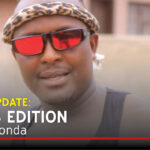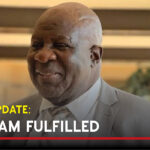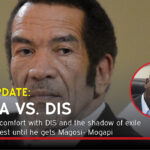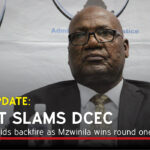Sugie Boikanyo Baleseng joined Karate when she was 10 years old back in 1989 and became one of the first female karatekas in Botswana.

Baleseng sparred with a man in her first tournament since there were no female opponents for her to fight.
She became part of the Botswana Karate National Team and represented the country in regional and international competitions like the British Open and Commonwealth games.
In 1997 when she was doing her national service (Tirelo Sechaba) Baleseng earned a black belt.
In 2003 when she was in training camp for Africa Games, her parents advised her to quit the sport as they felt it was affecting her studies for Bachelor of Sciences at the University of Botswana.
She headed her parents’ advice and quit as a player but continued as a national kata and Kumite referee.
Baleseng is currently Botswana Karate Association (BOKA) Women’s Commission chairperson.
The 41-year-old Kanye born sports administrator recently became the first Safeguarding officer from this country appointed by the World Karate Federation. (WKF)
Our reporter Portia Mlilo caught up with her to discuss her recent appointment and what her new role entails.
Congratulations on your recent World Karate Federation appointment, what does your role as a nation-safeguarding officer entail?
A. As a Safeguarding officer I am responsible for ensuring that karate is a safe sport for all its participants (athletes, coaches, managers and other stakeholders) from any misconduct mainly abuse (sexual, verbal, physical) and harassment of any kind even cyber.
BOKA aims to educate athletes on the correct channels to utilise in reporting misconduct.
This is part of our efforts to provide a safe environment for all karatekas and to make the sport enjoyable without any fear or prejudice.
Athletes have the right to enjoy a safe and supportive sports environment.
Q Why is it necessary to have safeguarding officer at BOKA?
A. It is a requirement of WKF. This is a new post and the first appointment in BOKA. The post was created to get prompt results by quickening the reporting process to reduce the time taken between reporting abuses and getting assistance.
We are losing a lot of talented athletes due to both locally and internationally and BOKA wants to curb that.
We will be very strict and we will be involving the Botswana police, social workers and other organisations that can assist where necessary.
WASBO has also shared with me its Sexual harassment policy to assist.
These sorts of cases used to be tried by the disciplinary committee.
The committee is still there but we just want to treat such cases with the urgency they deserve.
Cases of harassment are there although I can’t give you the exact numbers.
Q What does this appointment mean to you?
A. The appointment means a lot to me. It’s a validation that I am doing something right which got the World Federation’s attention.
I live to grow and this is a great opportunity to improve my leadership skills.
I love karate, I believe I will be able to help youth who find themselves in situations they don’t understand either at home or their dojos.
Safeguarding ensures absolute confidentiality.
Q. For how long are you going to serve in that role?
A. The period of service has not been specified.
BOKA is putting things in perspective.
We are putting tools in place and we are done with the policy just waiting for its implementation.
The post became available during the Covid-19 outbreak and things have been slow.
We have however managed to hold a workshop for Federations seeking their input on the policy as well as sensitising them on what is required of them.
Q. What were the criteria used for your appointment?
A. I was not actively participating in karate and two years back BOKA Executive Committee gave me the role of Chairperson of the Women’s’ commission which ensures the fundamental right of equality among women and men in Karate.
BOKA leadership is empowering a lot of women by giving us roles to play in the Association.
I do not know the criteria they used but the BOKA Executive Committee asked me to submit my CV, which they sent to the World Karate Federation.
Q What does BOKA policy say about athletes’ protection?
A. Safeguarding Karatekas all over Botswana is paramount to BOKA.
Any non-accidental violence will not be tolerated and will constitute a violation of BOKA and WKF disciplinary and Ethics code as well as the IOC code of Ethics.
Q. What does Women’s Commission BOKA do?
A. It ensures the fundamental right of equality among women and men in Karate.
Covid has disrupted our plans for this year and slowed down a lot, unfortunately.
I move around clubs when invited to sensitise them about Safeguarding.
I have held workshops for different federations about solutions that can help keep sport safe for all.
Hopefully, we will have workshops before the end of the year.
Q. Why did you choose karate as a sport, what made you join it?
A. The late Sensei came to Lesedi Primary School to recruit karatekas and I became interested.
I was part of the school traditional group and I left them to join karate and never looked back.
My first karate club was Kutlwano.
I am currently training under Botswana Shito-Ryu Federation under the instruction of Sensei Union Kgafela who is currently a 5th Dan black belt.
Q. What has been some of your lowlights as the Chairperson?
A. There is a lack of support from fellow Karatekas.
It is frustrating to try and win people over when presenting issues of abuse because many people are still uncomfortable discussing such issues.
Q. We have less participation of women in sport both as athletes and leadership, what do you think are some of the contributing factors?
A. There are many more girls in the under 18 categories than there are in the over 21 categories.
This may be mainly due to social aspects like studies, marriage and motherhood.
Karate is culturally not accepted as it exerts physical prowess hence many ladies quit, as they grow older.
Karate is a male-dominated sport and needs our male partners to support us.
Women in sport continue to be undermined and their participation not given equal value to that of their male counterparts.
There are general inequalities like unequal pay for some sports, which means that women have to work harder to earn a living out of sports.
It is demoralizing but we should fight this and come up with strategies to increase our participation in sport and leadership.
Q. What does it take for one to be a great Sports Administrator?
A. An administrator has to be selfless.
Sport does not pay and volunteering my services free of charge gives me gratification.
I am learning new things in the process and that builds me in all areas of my life.
Q. What advise can you give to female sport administrators?
A. Be driven and represent women in the best way possible to prove that we can indeed be successful in a profession dominated by men.
You should also be prepared to work long hours.
Time management is important so that you can be able to balance your personal and sport lives.
Women have to work harder to earn the respect of their male counterparts but we are very capable.
Let us not be intimidated. Just be yourself!
Be confident in your decisions and make sure they are defendable.
Q. What is your plans in karate administration?
A. My focus is more on sports management.
I aspire to be president of BOKA one day.
Karate is a sport that has taught me both individuality and teamwork aspects, which has become handy in my day-to-day life.
Q. Who is your inspiration?
A. I am inspired by Unaswi Matebu president of the Botswana Hockey Federation.
She is where I want to be.
She has shown me that contrary to what we believe, a sporting code can have a female leader.
Hockey is reaching out to as many youths as they possibly can and it’s not a common sport in Botswana.
She is doing well as a leader.
Q. Thank God it’s Friday, what are your plans for the weekend?
A. Weekends are for family.
I am a mother to two young boys and they keep me busy.
I also love reading books, magazines and newspapers


















